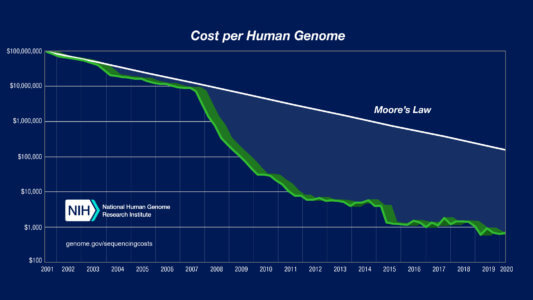In many cases, health insurance plans will cover the costs of genetic testing when it is recommended by a doctor. Health insurance providers have different policies about which tests are covered, however.
Some people may choose not to use their insurance to pay for testing because the results of a genetic test can affect a person’s insurance coverage. Instead, they may opt to pay out-of-pocket for the test. People considering genetic testing may want to find out more about their state’s privacy protection laws before they ask their insurance company to cover the costs.
Genomic Medicine Potential
Genomic medicine has the capacity to revolutionize clinical practice. The mapping of the human genome has created new opportunities for genetic tests to predict, prevent and treat disease. Tests for breast cancer and for hereditary forms of colorectal cancer can assess disease risk and guide screening and preventive measures. Other tests can predict optimal chemotherapy regimens, or predict the likelihood of drug response or toxicities and avoid exposing patients to ineffective or overly toxic regimens.
One key factor driving the practical use of genomics in a clinical setting is the falling cost of genetic testing. Innovation in genome-sequencing technologies and strategies is accelerating. As a result, one can readily expect continued reductions in the cost for human genome sequencing. Assessing the ‘value’ associated with an estimated cost for generating a human genome sequence – in particular, the amount of the genome (whole versus exome), quality, and associated data analysis (if any) – will likely remain largely the same. With new DNA-sequencing platforms anticipated in the coming years, the nature of the generated sequence data and the associated costs will likely continue to be dynamic.

There are many other examples of clinically useful information available through newly developed genetic tests. In order for patients to have full access to the benefits of genetic testing, payers such as insurance companies and Medicare need systematic ways of evaluating genetic tests for reimbursement. Currently, there are barriers that make it difficult for payers to do so. Without this information, insurers cannot properly assess how to reimburse for genetic tests.
One challenge insurers face is the difficulty of deciding when to reimburse for genetic tests that health care providers have offered their patients. The reason this is difficult is that insurers may not be able to easily evaluate what type of genetic test was performed, whether the test was appropriate to perform and whether the test is scientifically valid. This is in part because procedures are billed according to a standardized system of Current Procedural Terminology (CPT) codes developed by the American Medical Association, and fewer than 200 CPT codes exist for about 70,000 genetic tests. This means that there is no straightforward way to bill for many tests or for payers to identify what genetic tests were given.
Moreover, payers are having trouble keeping up with the volume of new genetic and next-generation sequencing tests that are coming onto the market. Additionally, there is a lack of extensive data evaluating the economics of genetic testing. This makes it even more difficult to evaluate which tests should be covered and under what circumstances they should be covered.
Here are several reports prepared by policy and scientific experts seeking to advise Federal agencies on how to reimburse for genetic tests:
- Coverage and Reimbursement of Genetic Tests and Services (HHS Secretary’s Advisory Committee on Genetics, Health, and Society)
- An Evidence Framework for Genetic Testing (National Academies of Sciences, Engineering, and Medicine)
Another issue where genetics intersects with health insurance is genetic discrimination. Some people who receive genetic testing may be concerned about the privacy of their results and whether insurance companies could use a genetic diagnosis to deny coverage or determine premiums. To address these concerns, there is a Federal law called the Genetic Information Nondiscrimination Act (GINA) that prevents insurers from discriminating against patients in these manners. There are also different state laws that add further protections to prevent genetic discrimination by insurers.

